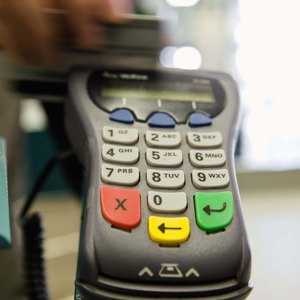
Debit cards provide a convenient way to purchase items such as food, gas and clothes. When you use a debit card, you enter a personal identification number, or PIN, to withdraw the purchase amount from your bank account. The unauthorized use of your debit card can deplete your bank account and expose you to identity theft. If your card is lost or stolen, you can limit or eliminate your losses and prevent others from damaging your credit, but you have to act promptly by reporting the misuse of your card.
Lost or Stolen Card
Call or go to your bank as soon as you discover your card has been stolen or lost. You are not responsible for any charges made after you report your card stolen or lost. If you wait two days (not counting Saturdays, Sundays or holidays when the bank is closed) to report a lost or stolen card, the bank can hold you responsible for up to $50. If you wait longer than two days, you can lose money until you report the lost or stolen card, up to $500. Pull your online bank statement and look for purchases or withdrawals you did not make. Identify the dates and places where the card was used and the amounts.
Disputing Bank Statement
Carefully review your bank statement for errors and unauthorized uses. Contact your bank immediately if you see any such uses. You have 60 days from the date of your statement to dispute errors; if you do not, you could be responsible for all the money taken out of your account. Identify in writing the uses that are unauthorized; you may even copy and highlight the ones you contest. Send by certified mail to the address listed for disputes on your bank statement so that you have proof the bank received the dispute.
Police Report
Report the use of your debit card to the police department or sheriff's office; this will create a record that you might be considered an identity theft victim. Depending on where you live, you will be asked to complete a form to detail the unauthorized use. When you report the incidents, you will need your bank account number, debit card number and a copy of a paper or online statement showing the date, place and amount of the transactions. You might have to list those people you allowed to have your debit card or PIN.
Fraud Alert
You may request that Equifax, TransUnion or Experian place a "fraud alert" on your credit report; the credit reporting agency to whom you ask for the alert must notify the other two agencies. If someone attempts to open a credit card account, borrow money, increase a credit limit or get a card on an existing account, the credit card company must try to verify that you have requested a credit card or credit limit increase or deny the request. The initial alert lasts 90 days; with a police report or other proof that you are an identity theft victim, the alert will remain for seven years.
Preventing Debit Card Misuse
Avoid carrying your PIN in your wallet or with your card or letting others use your card. You likely will not recover lost money if you allow someone, even a relative, to use your card and that person depletes your account. If you have allowed someone to use your card and suspect fraud, ask your bank to remove that person's authority to use the card.
References
- Consumer Financial Protection Bureau. "What Is the Difference Between a Prepaid Card, Credit Card, and a Debit Card?" Accessed Jan. 13, 2020.
- Consumer.gov. "Using Debit Cards." Accessed Jan. 13, 2020.
- Consumer.gov. "Using Credit." Accessed Jan. 13, 2020.
- FDIC. "When and Why Your Credit Card Interest Rate Can Go Up." Accessed Jan. 13, 2020.
- Discover. "Discover Will No Longer Require Signatures at Checkout." Accessed Jan. 13, 2020.
- Mastercard. "Mastercard Retires Customer Signatures." Accessed Jan. 13, 2020.
- Enterprise. "What Forms of Payment Are Accepted for Renting a Car?" Accessed Jan. 13, 2020.
- Federal Trade Commission Consumer Information. "Lost or Stolen Credit, ATM, and Debit Cards." Accessed Jan. 13, 2020.
- Federal Trade Commission. "Disputing Credit Card Charges." Accesssed Jan. 13, 2020.
Resources
Writer Bio
Christopher Raines enjoys sharing his knowledge of business, financial matters and the law. He earned his business administration and law degrees from the University of North Carolina at Chapel Hill. As a lawyer since August 1996, Raines has handled cases involving business, consumer and other areas of the law.

